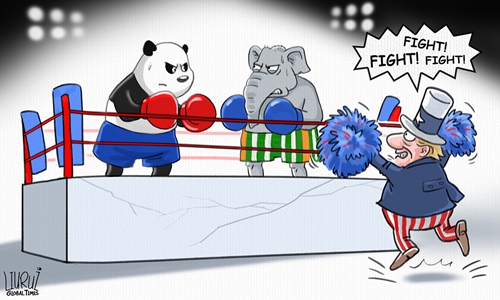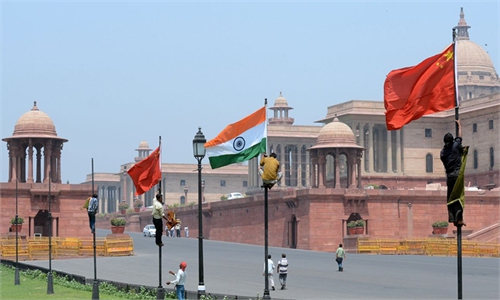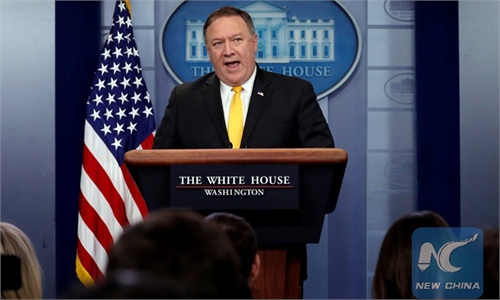
Illustration: Liu Rui/GT
China-India relations are undergoing their worst crisis since the 1962 border war between the two Asian giants, which has been to the detriment of both countries.
However, instead of calling for rational dialogue to de-escalate tensions, some Western media outlets are fanning the flames of tension between India and China. They hailed India leading global powers to counter China's "wolf warrior"diplomacy, as if the South Asian country is a "hero" standing up to China's "bullying."
"Wolf warrior" diplomacy, named after a Chinese patriotic action film depicting how a squad of Chinese soldiers protected Chinese civilians overseas, is an accusation made by the West on China's current diplomatic style. Uncomfortably feeling challenged by a China that is safeguarding its own interests in a more direct approach in the face of increasing suppression by Western forces, the West accuses China's diplomacy and diplomats of being increasingly aggressive and belligerent.
China has never been a "wolf" in its relations with India and in other issues concerning China's core interests. After a serious physical clash between Indian and Chinese border troops, Indian Prime Minister Narendra Modi said at an all-party meeting that Chinese troops did not intrude into the Indian territory.
Since the violent clash, China has maintained restraint and rationality to its utmost. But India, driven by rising nationalism and with the support of some Western countries, didn't take action to de-escalate tensions. Instead, it has taken more aggressive steps, including launching a "boycott Chinese products" campaign and banning 59 Chinese apps. It created additional waves on the Hong Kong issue, claiming to "keep a close watch" on the development of China's national security law for Hong Kong at the UN Human Rights Council in Geneva. Apparently, India is trying to pile more pressure on China by rallying domestic and international support.
When it comes to China's disputes with neighboring countries like Japan and other South China Sea claimants, it's not difficult to tell that almost every flare-up has had the meddling from external powers. Fortunately, relevant countries have come to realize that the aim of the external power is to fish interests from conflicts between China and regional countries, and disputes normally have been cooled down through consultations.
Liu Xiaoming, Chinese ambassador to the UK, in an interview in May dismissed the "wolf warrior diplomacy" accusation, emphasizing that "the reason why there's a warrior fighting a wolf is because there are wolves in this world." China has to strongly fight back when faced with wolves, he stressed.
The Western media is good at throwing mud at China and manipulating public opinion. Since the China-India border clash, China has been actively pushing for de-escalation, calling on the two countries to maintain the overall situation of bilateral relations. However, backed up by some Western countries and media outlets, Indians have gained the misunderstanding that they have the moral high ground to deal with a Chinese "wolf warrior." It's a pity. India should not fall into the trap of Western public opinion or serve as a cannon fodder for the West at the cost of its own interests.
Verbal support from the West won't give India any real advantage, nor will it change the nature of the Galwan Valley clash. If India, deluded by Western public opinion, is stubbornly determined to act as a "wolf" that provokes China, China will firmly respond and won't yield an inch in safeguarding its sovereign integrity.



